An annuity mortgage is a financial product whereby a borrower repays the loan with regular and fixed payments over a stipulated time. This mortgage type is characterized by consistent payments covering both the principal and interest amounts. The unique feature of an annuity mortgage is that each payment reduces the principal loan amount, decreasing the interest with each subsequent payment. Unlike interest-only mortgages, where the borrower only pays the interest during the mortgage term and repays the principal in a lump sum at the end, annuity mortgages involve paying both the principal and interest simultaneously. This feature distinguishes an annuity mortgage from other mortgage types and offers financial predictability for the borrower. Before applying for an annuity mortgage, you need to meet specific initial requirements. These typically include having a stable income, maintaining a good credit score, and having enough savings for a down payment. You should also be financially prepared to make consistent mortgage payments over the years. The annuity mortgage application process requires providing financial documents, completing a loan application, and undergoing a credit check. Once approved, you finalize the mortgage terms, which include the loan amount, the interest rate, and the repayment schedule. Financial institutions play a critical role in the process of acquiring an annuity mortgage. They evaluate your creditworthiness, approve your loan application, provide the loan funds, and manage the repayment process. The payment structure of an annuity mortgage is straightforward. Each repayment is divided into the interest payment and the principal repayment. Initially, the interest component is larger, but as the principal reduces over time, the interest component decreases, and the principal component increases. Annuity mortgage payments are calculated based on the principal amount, interest rate, and mortgage term. Mortgage lenders use an amortization schedule, which outlines the payments over time, showing how much of each payment goes toward the principal and interest. Interest rates play a pivotal role in annuity mortgages. The interest rate determines the total amount paid over the life of the mortgage. Fixed interest rates offer stability, while variable rates provide potential benefits if market rates decrease. The constant payment mortgage, an annuity mortgage, provides consistent payments throughout the mortgage term. This offers a clear roadmap for borrowers, making it easier to budget and plan long-term finances. Despite inflation or changes in interest rates, the payment amount remains constant, thereby ensuring stability. The graduated payment mortgage caters to borrowers who expect a steady rise in their income over the years. The repayment starts with smaller installments which gradually increase over time. This structure provides initial financial relief to borrowers; however, they must be prepared for larger payments in the future. The interest-only mortgage, another variant of an annuity mortgage, requires borrowers to pay only the interest for a predetermined period. Following this period, payments increase as they now include both the principal and the interest. While this option offers initial lower payments, borrowers should brace for higher installments in the latter part of the mortgage term. The annuity mortgage offers a predictable and stable repayment schedule. This feature makes budgeting easier for borrowers and provides financial stability. Annuity mortgages can be cost-efficient in the long run. Regular principal and interest payments ensure that the loan is gradually repaid, potentially saving money compared to interest-only mortgages. The initial payments for an annuity mortgage can be higher than interest-only or adjustable-rate mortgages. This aspect could pose a challenge for borrowers with tight budgets. With fixed payments, annuity mortgages can be less flexible than other mortgage types. If a borrowers' financial situation changes, they may find it difficult to adjust their payment plan. Annuity and traditional mortgages are two distinct types of home loans, and their primary difference lies in how repayments are structured. In an annuity mortgage, the repayments are regular and constant. Each repayment installment comprises a portion of the principal and the interest. The key feature of an annuity mortgage is that the total repayment amount (principal plus interest) remains the same throughout the loan term. This constant repayment structure can benefit those looking for predictability and stability in their financial planning. In contrast, a traditional or standard mortgage, often known as an amortizing mortgage, can have varying repayments. In the early years of the mortgage term, repayments are primarily directed toward the interest, and a smaller portion goes towards paying down the principal. As the mortgage matures, a larger portion of each payment is applied to the principal while the interest component decreases. This means that while the total payment remains the same over the life of the loan, the proportion of interest to the principal changes over time. Choosing between an annuity mortgage and a traditional mortgage requires careful consideration of several factors. Income Stability: If you have a stable income that will remain the same for the foreseeable future, an annuity mortgage may be a suitable option as it offers predictable and consistent payments. However, if your income is expected to increase significantly in the future, a traditional mortgage may be more beneficial as you can bear the higher principal payments later. Financial Goals: Your long-term financial goals should also be significant in this decision. A traditional mortgage may be better suited if you aim to pay off your mortgage quickly or desire to reduce total interest costs. However, an annuity mortgage could be more fitting if your goal is to maintain a consistent repayment structure for better budgeting. Risk Tolerance: Annuity mortgages could be seen as less risky due to their predictable repayment structure, but they can have higher initial payments. Conversely, traditional mortgages can start with lower payments but become more costly over time. Future Income Potential: If you're starting your career or in a fast-growing industry and expect your income to increase significantly, you may be better suited to a traditional mortgage. This is because you'll be better equipped to handle the larger principal payments in the future. In the realm of retirement planning, an annuity mortgage can play a significant role as a part of a robust income strategy. One of the key features of an annuity mortgage is its predictable payment schedule. Borrowers know exactly how much they will receive and when providing a steady income stream during retirement years. This level of predictability can greatly assist with budgeting and financial planning. For instance, retirees who own their home outright or have substantial equity may choose to take out an annuity mortgage on their property. Their regular payments can cover daily living expenses, medical bills, leisure activities, or any other costs arising during retirement. While an annuity mortgage can be an effective tool in a retirement income strategy, it should not be the only one. It's essential to consider an annuity mortgage in conjunction with other income sources to ensure a diversified and well-rounded retirement plan. Traditional sources of retirement income include pensions, investment returns, and social security benefits. Each component, combined with the steady income from an annuity mortgage, contributes to a comprehensive retirement income plan. This integrated approach ensures you have a balanced and sustainable source of income during your retirement years. An annuity mortgage is a financial product that offers a regular and fixed repayment schedule, including both the principal and interest amount. It provides predictability and stability but requires careful consideration, given its long-term commitment and potential for higher initial payments. Choosing an annuity mortgage involves carefully evaluating several factors, including your financial stability, future income potential, and retirement goals. Understanding the implications of an annuity mortgage on your financial health is essential. Professional financial advice can provide valuable insights when considering an annuity mortgage. Financial advisors can offer personalized guidance, helping you understand the nuances of an annuity mortgage and how it aligns with your financial goals. As with any financial decision, performing your due diligence and making informed decisions that best suit your needs is crucial.What Is an Annuity Mortgage?
Steps When Considering an Annuity Mortgage
Meeting Initial Requirements
Navigating the Application Process
Engaging With Financial Institutions
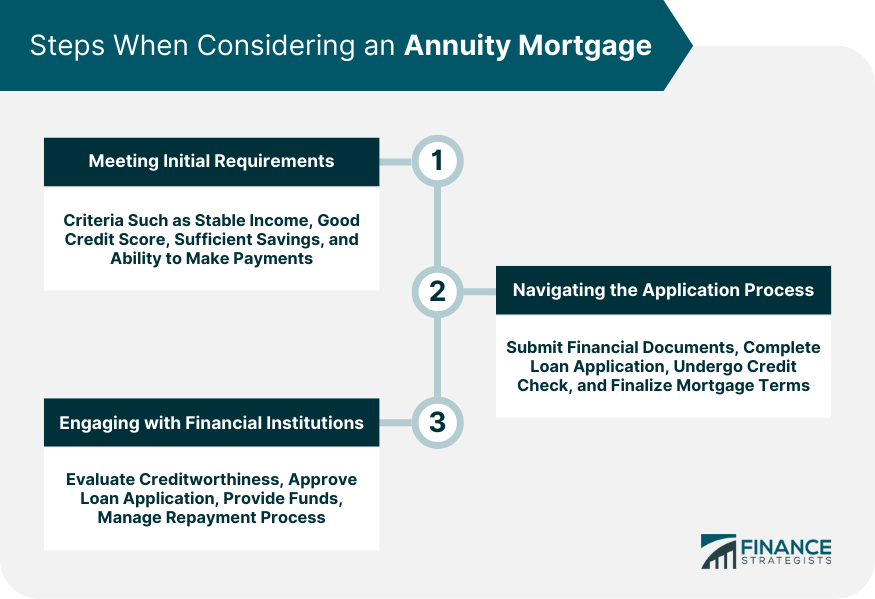
Workings of an Annuity Mortgage
Payment Structure
Calculation of Annuity Mortgage Payments
Interest Rates and Annuity Mortgage
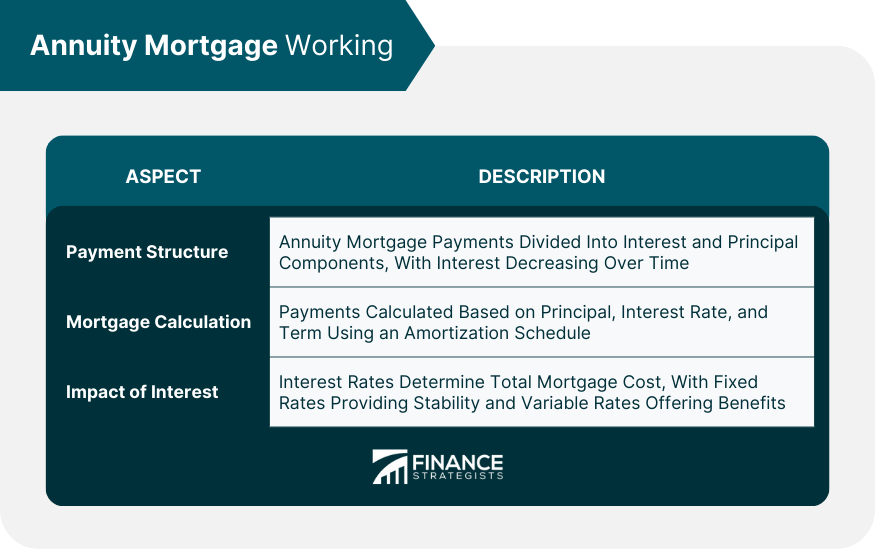
Types of Annuity Mortgages
Constant Payment Mortgage
Graduated Payment Mortgage
Interest-Only Mortgage
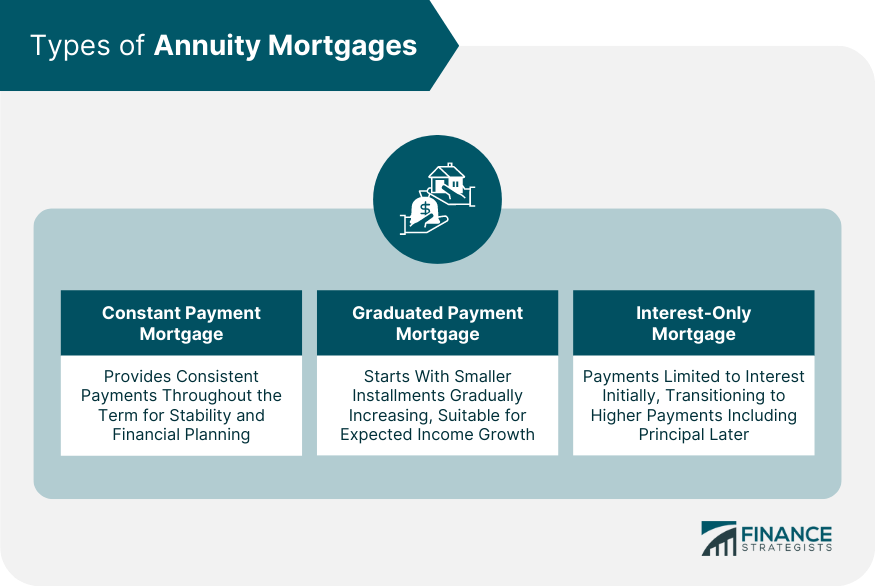
Advantages of Annuity Mortgages
Predictability and Stability
Long-Term Cost Efficiency
Disadvantages of Annuity Mortgages
Potential for High Initial Payments
Risk Factors to Consider
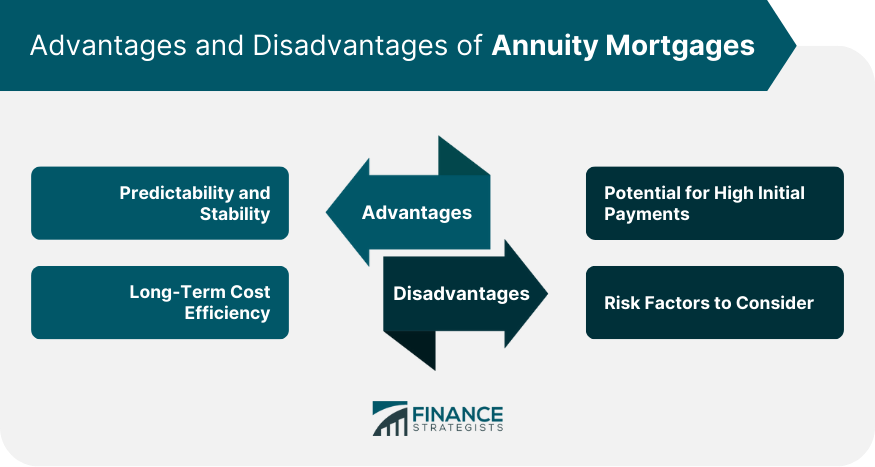
Annuity Mortgage vs Traditional Mortgage
Comparative Analysis
Factors to Consider When Choosing
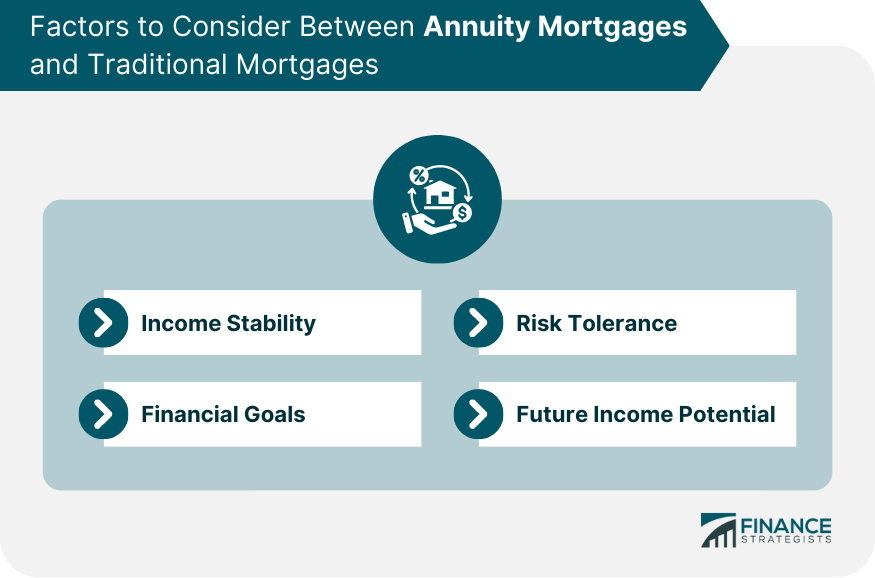
Annuity Mortgage and Retirement Planning
Role in Retirement Income Strategy
Relation to Other Retirement Income Sources
Conclusion
Annuity Mortgage FAQs
If a person cannot make scheduled payments on their annuity mortgage, contacting their lender is crucial as soon as possible. They can negotiate a temporarily reduced payment plan or refinancing to avoid foreclosure.
Yes, it's possible to pay off an annuity mortgage early. However, some lenders might charge an early repayment fee, also known as a prepayment penalty. It's advisable to check the mortgage agreement or consult with their lender about any potential fees.
An annuity mortgage can have either a fixed or variable interest rate. While a fixed rate provides predictability with the same interest rate throughout the loan term, a variable rate can change based on market conditions.
An annuity mortgage can be suitable for first-time homebuyers who can afford consistent payments and prefer predictable budgeting. However, each individual's situation is unique, so it's important to consider all factors and consult with a financial advisor.
The term length significantly impacts the cost of an annuity mortgage. A longer-term means more interest paid over the life of the loan, resulting in a higher overall cost. However, a longer-term typically means lower monthly payments than a shorter-term loan.
True Tamplin is a published author, public speaker, CEO of UpDigital, and founder of Finance Strategists.
True is a Certified Educator in Personal Finance (CEPF®), author of The Handy Financial Ratios Guide, a member of the Society for Advancing Business Editing and Writing, contributes to his financial education site, Finance Strategists, and has spoken to various financial communities such as the CFA Institute, as well as university students like his Alma mater, Biola University, where he received a bachelor of science in business and data analytics.
To learn more about True, visit his personal website or view his author profiles on Amazon, Nasdaq and Forbes.











